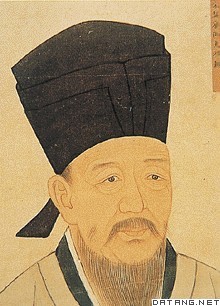Chinese philosopher
Chéng Hào (Chinese: 程顥, 1032–1085), Courtesy name Bóchún (Chinese: 伯淳), was a Chinese philosopher and politician from Luoyang, China. In his youth, he and his younger brother Cheng Yi were students of Zhou Dunyi, one of the architects of Neo-Confucian cosmology. His philosophy was dualistic (between all that is tangible and all that is intangible) and pantheistic (believing that all that is intangible is the same thing, such as god, the human nature, feelings, actions (we see things acting, but not the action itself), movement (likewise), social roles and relations (likewise), chance, etc., and that such a unified, universal principle is in everything that is sensible [rather than in an external reality as in Platonism]); among his quotes are "outside dao there are no things and outside things there is no dao", "we call it god to emphasize the wonderful mystery of principle in ten thousand things, just as we call it lord (di) to characterize its being the ruler of events" and "in terms of the reality, it is change; in terms of principle, it is dao; in terms of its function, it is god; in terms of its destiny in a human being, it is human nature".[1]
